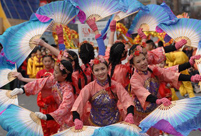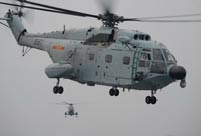SEOUL, Feb. 13 -- The Democratic People's Republic of Korea (DPRK) called for South Korea to delay the joint military exercises with the United States to dates after the agreed family reunion during the senior-level talks held at the border village of Panmunjeom, Seoul's Unification Ministry said Thursday.
Five-member delegations from both sides began their first high- level, inter-governmental dialogue in about seven years around 10 a.m. Wednesday local time at the Peace House, an administrative building in the South Korean side of the truce village of Panmunjeom.
The high-ranking officials held a marathon dialogue, including two rounds of plenary talks and two separate chief delegate contacts, until around 11:35 p.m. local time, but they ended the dialogue without any specific agreement.
The DPRK delegation returned home at around 00:10 a.m. Thursday local time, the ministry said. The delegation was led by Won Dong- yon, deputy head of the United Front Department of the ruling Workers' Party of Korea.
The South Korean delegation was headed by Kim Kyou-hyun, deputy director of the presidential national security office and former vice foreign minister.
During the senior-level talks, the DPRK linked the family reunion to the joint military exercises between Seoul and Washington, demanding the postponement of the annual drills to dates after ending the reunion event, according to the ministry.
Seoul and Pyongyang agreed last week to hold reunion of families separated by the 1950-53 Korean War from Feb. 20 to Feb. 25 at the DPRK's scenic resort of Mount Kumgang.
Seoul's Defense Ministry said Monday that combined forces of South Korea and the United States will carry out the "Key Resolve" and "Foal Eagle" war games from Feb. 24 to April 18, dates that overlap for two days with the family reunion event.
In response to the DPRK's demand, South Korea said that the humanitarian event cannot be connected with the military issue, refusing to accept Pyongyang's call.
The DPRK side urged the South to control local media reports, which slandered its regime and supreme dignity, which indicates the DPRK's top leader Kim Jong Un.
The DPRK's National Defense Commission said last Thursday that the family reunion can be reviewed if the South side's slandering of its supreme dignity continues, citing negative reports of some South Korean media on the top DPRK leader's visit to childcare centers.
The commission also repeated its call for the cancellation of the South Korea-U.S. annual military drills, saying that dialogue and the rehearsal for war of aggression can never be compatible.
Regarding the issue, the South Korean delegation said during the talks that the government cannot control local news organizations.
The South Korean delegation told their DPRK counterpart that the family reunion event to be held without a hitch will be the first step to improve inter-Korean relations, offering to build trust between the two Koreas by staging the humanitarian event as agreed.
In response, the DPRK said that South Korea should accept its earlier "important proposal" made on Jan. 16 by the DPRK's top military body, which called for the end of all hostile acts, including mutual slandering and military hostilities.
The ministry said that the two Koreas agreed to continue to consult with each other about the issues discussed at the high- level meeting.
The inter-Korean talks between high-ranking officials, which came first since May 2007, took unusually long time to end as the dialogue was held with no predetermined agenda. At the two rounds of plenary session, the two sides were estimated to focus on explaining their priority agendas, leading to reaffirm differences between the two Koreas.
Despite the differences, holding the senior-level talks itself was expected to help improve inter-Korean ties, which turned sour after the DPRK's third nuclear test in February last year and the subsequent threats of nuclear strike against the U.S. and South Korea.
Chinese Foreign Ministry spokeswoman Hua Chunying told a press briefing Wednesday, "we welcome the talks between the two sides, and wish that they yield positive results." China has always encouraged the DPRK and the Republic of Korea to improve ties and promote reconciliation via dialogue, according to Hua.
 Highlights of opening ceremony of Sochi 2014 Winter Olympic Games
Highlights of opening ceremony of Sochi 2014 Winter Olympic Games Highlights of Chinese New Year celebrations around the world
Highlights of Chinese New Year celebrations around the world  Chinese ship formation conducts live fire training in West Pacific
Chinese ship formation conducts live fire training in West Pacific Sanya bans skinny dipping in public beach
Sanya bans skinny dipping in public beach Top 20 most beautiful Chinese stars
Top 20 most beautiful Chinese stars  PLA navy conducts landing drills in South China Sea
PLA navy conducts landing drills in South China Sea  Snowscape in Chinese New Year
Snowscape in Chinese New Year Top 10 timeless female Chinese stars
Top 10 timeless female Chinese stars Top 10 Chinese films in 2013
Top 10 Chinese films in 2013 New Year greetings from Chinese nationals in Africa
New Year greetings from Chinese nationals in Africa Miss Chinese Int'l Pageant 2014 held in Hong Kong
Miss Chinese Int'l Pageant 2014 held in Hong Kong Severe coldness freezes large parts of China
Severe coldness freezes large parts of China  Beautiful moments of Sochi
Beautiful moments of Sochi  It's not just performing this year
It's not just performing this year Selfies of "Little colorful flag" girl unveiled
Selfies of "Little colorful flag" girl unveiled Day|Week|Month